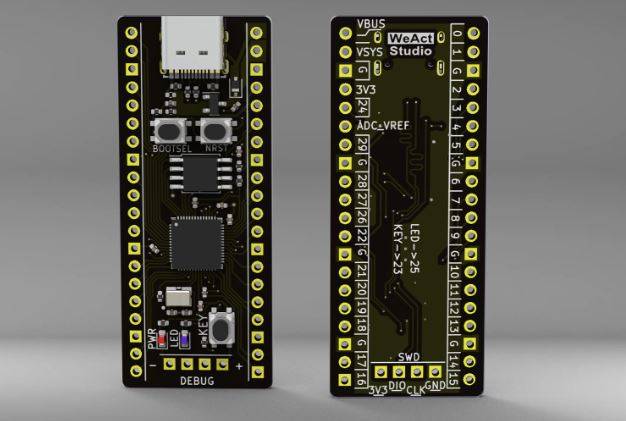WeAct RP2040 board upgrades the Raspberry Pi Pico physical factor with 16MB flash and a USB-C connection.
The WeAct RP2040 "clone" has up to 16MB flash and a USB Type-C connector for power and programming if the Raspberry Pi Pico's 2MB of QSPI memory is not quite enough for your requirements and you are not a fan of micro USB ports.
The inclusion of a reset button, which can be useful for flashing UF2 firmware, is another upgrade, although the pinout mostly stays the same. Although it is not nearly as inexpensive as the original Raspberry Pi Pico, the board costs only $5.99 with 2MB flash and $8.99 with 16MB flash, both with free delivery.
WeAct RP2040 Specification:
- RP2040 microcontroller chip designed by Raspberry Pi in the United Kingdom
- Dual-core Arm Cortex M0+ processor, flexible clock running up to 133 MHz
- 264KB of SRAM, and 2MB/4MB/8MB/16MB of onboard Flash memory
- USB 1.1 with device and host support
- Low-power sleep and dormant modes
- Drag-and-drop programming using mass storage over USB
- 26 × multi-function GPIO pins
- 2 × SPI, 2 × I2C, 2 × UART, 3 × 12-bit ADC, 16 × controllable PWM channels
- Accurate clock and timer on-chip
- Temperature sensor
- Accelerated floating-point libraries on-chip
- 8 × Programmable I/O (PIO) state machines for custom peripheral support
After accounting for VAT and shipping, the 2MB version of the board—which was introduced at the end of last year—is even less expensive to purchase than the Raspberry Pi Pico.
The board is also available from WeAct for $2.43 to $5.62 on Aliexpress, however, shipping is an additional $3.23 to the US.













